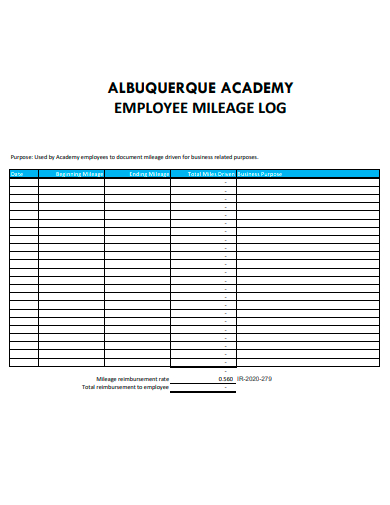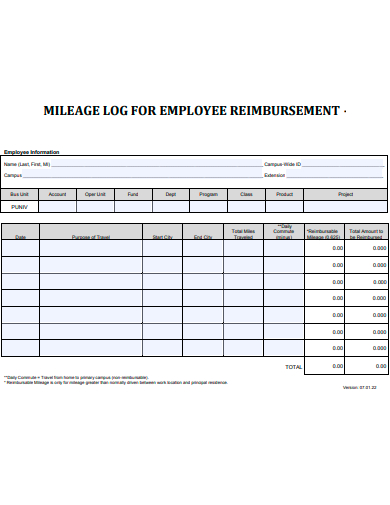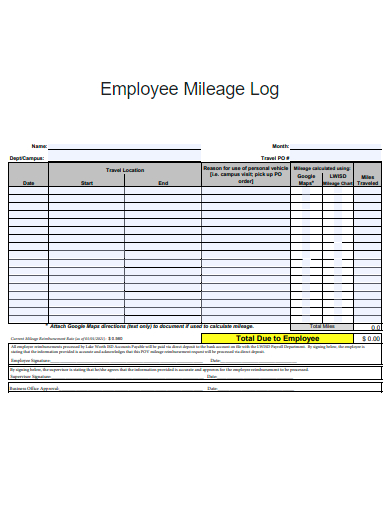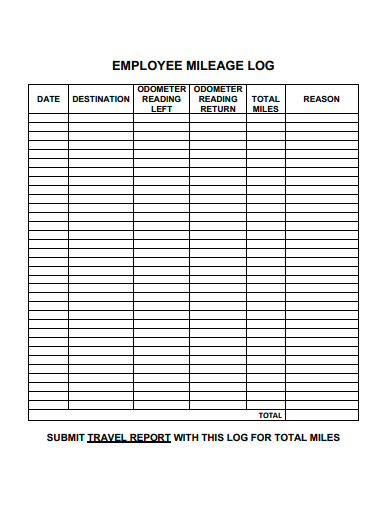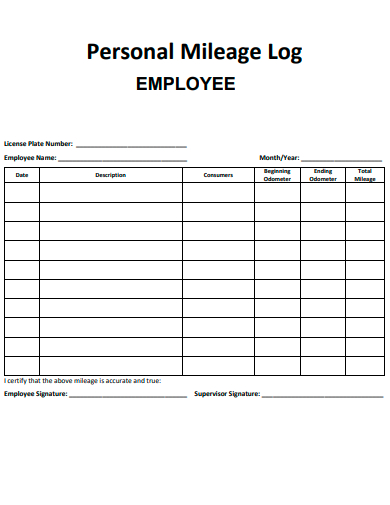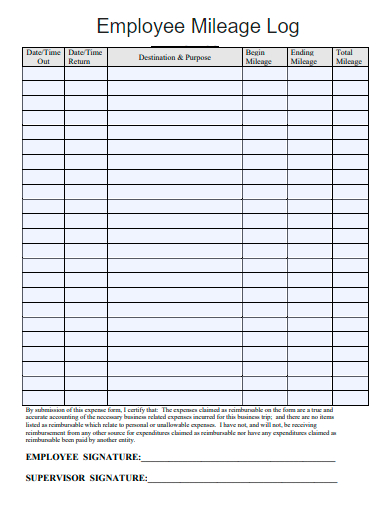A mileage is defined as the miles or average distance that you have traveled over a period of time. For a company that employs individuals who are required to operate or drive a vehicle, there is a possibility that they are utilizing a system to calculate and report their company mileage. The IRS requires different mileage log requirements for every company or business to ensure that they comply with their rules and regulations. However, regardless of their situation, businesses will be required to keep records of the mileage for each of their business use, the total mileage for the year, the time, place, and purpose written in their business trip report, and the odometer readings at the beginning and end of the year.
FREE 5+ Employee Mileage Log Samples
1. Academy Employee Mileage Log
2. Employee Reimbursement Mileage Log
3. Employee Mileage Log Example
4. Sample Employee Mileage Log
5. Employee Personal Mileage Log
6. Employee Mileage Log in PDF
What is an Employee Mileage Log?
Companies have specific jobs that require their employees to use their personal vehicles for business-related purposes. If you are working for one of these companies and they require you to use your private vehicle for business trips, it is essential that you keep a mileage log. An employee mileage log is a log sheet template that allows you to document the number of miles you have traveled using your private car for a business trip over a certain period of time. You can use this log to claim tax deductions or ask for reimbursement from your boss. They can also use an expense sheet, spending tracker, or payment record in addition to their mileage lod to track each of their business-related transactions.
How to Use an Employee Mileage Log
There are various ways to use a mileage log. You can download a mileage tracker on your device or download and print a mileage log template. Failing to keep correct mileage documentation can result in severe penalties for individuals or businesses and failing in submitting it can subject you to getting audited by the Internal Revenue Service or IRS. A company mileage reimbursement form or log supports various programs such as company car allowance, vehicle reimbursement program, gas card or fuel reimbursement, and company car allowance with mileage substantiation.
Step 1: Double-Check If you Qualify for a Mileage Deduction
There are specific conditions to qualify a taxpayer to claim a deduction for mileage used for driving their cars during business trips each tax year. These qualifications include conducting errands related to the business, medical appointments, moving between offices or posts, and performing tasks with a charitable company.
Step 2: Choose your Calculation Method
There are two ways to calculate your mileage deduction amount which are the standard mileage deduction and the deduction for vehicle expenses.
Step 3: Document your Odometer Readings
Make sure to document your odometer readings at the start and end of the tax year, especially if you are using the standard mileage deduction method for your calculations.
Step 4: Keep a Record of Your Receipts
If you are using the actual expense deduction method for your calculations, you have to keep copies of essential receipts and other expense transaction records. Make sure it has the date, amount of the purchased service, and a description of the product or service required.
FAQs
Why do businesses have to keep records of their employees’ mileage?
Businesses document their employees’ mileage to give proof of business mileage to write off allowances for the company car, keep their employee allowances tax-free, reimburse the employee for their vehicle expenses, and substantiate their use of fuel cards.
What are the benefits of tracking your mileage?
If you keep accurate mileage records, you can receive more tax deductions, maintain reliable and accurate records, and enables you to collect employer reimbursements.
What are the best practices for mileage tracking?
The best practices you have to observe during mileage tracking are investing in mileage trackers or tracking software, using a mileage tracking app on your device, and creating a company policy to ensure accuracy across the whole company.
An employee mileage log is a document used by employees to track the miles of the distance they have traveled using their private care or company car over a period of time. They later submit this document to their employers to claim reimbursement or tax deduction. The standard mileage deduction is a calculating method that requires the employee to document their odometer readings from the start to the end of a tax year.
Related Posts
FREE 16+ Time Log Samples & Templates in PDF MS Word
FREE 10+ Mileage Reimbursement Request Form Samples in PDF ...
FREE 9+ Sample Employee Tax Forms in MS Word PDF
FREE 10+ Time Log Templates in PDF MS Word
FREE 9+ Sample Workers Compensation Forms in MS Word PDF
FREE 6+ Sample Self Employment Tax Forms in PDF
FREE 6+ Sample Unreimbursed Employee Expense in PDF
FREE 49+ Claim Forms in PDF
FREE 13+ Sample Log Sheet Templates in Google Docs Google ...
FREE 33+ Sample Log Templates in PDF MS Word
FREE 10+ Expense Reimbursement Form Samples in PDF DOC ...
FREE 9+ Sample Travel Log Templates in PDF
FREE 9+ Behavior Log Samples in PDF
FREE 9+ Sample Travel Expense Calculator Templates in PDF
FREE 8+ Sample Expense Forms in PDF MS Word

